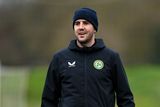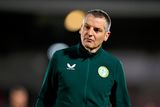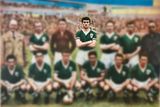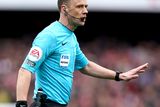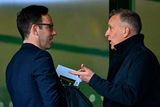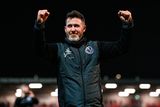How down-at-heel nation fell in love with Geordie in '86
Our Jack: taking a break during a training session at the World Cup in 1994. Photo: David Maher/SPORTSFILE
Off the field of play the impact of the Charlton-era on Irish society, and our economy, was simply immense.
Big Jack oozed defiance, self-confidence and displayed a complete reluctance to accept defeat - in many ways the traits of the gregarious Geordie quickly passed on to a nation on its knees.
Just two months before Jack was unveiled as manager of the national side, the unemployment rate in Ireland peaked at an astonishing 17.3pc.
Public services were appalling, taxes high, opportunities few and political corruption and uncertainty made a bad situation worse.
A total of 470,000 people emigrated during the bleakest of decades - the country was being bled dry of its young people.
A concert called Self-Aid was staged in '86 with the likes of a young U2 playing at the benefit event. Its aim was to highlight record levels of unemployment, to invite donations and to encourage job pledges.
And then, as if heaven-sent, through a cloud of smoke emerged a beaming Jack Charlton armed with a blueprint to lift national spirits and make us proud to be Irish again. Nobody really cared that it took an English World Cup winner to do this, all we knew was, for the first time in our lives, Ireland were dining at football's top table.
By the early Nineties, Ireland had risen to sixth in FIFA's world rankings.
Economists were drawing parallels between the unprecedented wave of national pride and confidence sweeping the country with economic prosperity and entrepreneurship. Birth rates soared in 1990 and '91 with many putting the baby boom down to the feel-good factor of Italia '90. Indeed the Celtic Tiger itself was said to have been born on a summer's evening in Genoa. We trusted Jack and he repaid us with sensational result after sensational result. It might not always have been pretty, but Jack made Ireland a force in world football.
The Irish, whether at home or abroad, travelled the world to roar on the boys in green.
They sang the songs, partied hard and made friends wherever they went. In many ways they were behaving as Jack himself would have done had he been a fan and not the gaffer.
And suddenly it became cool to be Irish. For the first time in a long time we liked what we saw when the mirror was held up to us. Olé, Olé, Olé indeed.
That feeling of national pride encouraged more confidence in retail trading, people were spending more and worrying less. Those who dared dream took a chance and set up their own business and we, as a people, rediscovered our smile.
And when Jack, the Prophet, needed us during USA '94, we wouldn't be found wanting. FIFA fined him for misconduct on the sideline during Ireland's 2-1 defeat to Mexico in the group stages, but the fans did a whip-round to pay the bill.
The victory over England in Stuttgart in Euro '88 under Jack's guidance lifted the national spirit beyond previously recorded highs. We had arrived and stuffed the auld enemy in the process. And things would get even better.
In reaching the quarter-finals of the World Cup in 1990, Jack had completed the incredible, just four years after pipping Bob Paisley to get the gig as manager.
A decade after Jack arrived, he left us, his work well and truly done. And when he walked through the departure gates of Dublin Airport in January 1996 as the 'former' Ireland manager, he could look back on a changed nation and acknowledge that he played no little part in pulling us from our knees and giving us the strength to soar.
